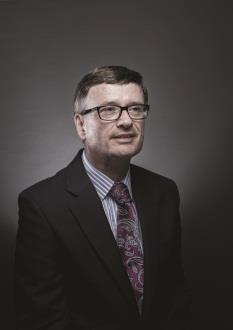Sir Dan Moynihan, chief executive of the Harris Federation, is a maestro of turning around failing schools. Alison Moore learns how his methodology can be applied to the NHS

Sir Dan Moynihan CEO of Harris Federation
From the outside the Harris Academy Falconwood, in Welling, Kent, looks more like a conference centre, or even an airport terminal, than a school, with its expanses of glass and soaring ceilings.
Inside, purple dominates - the personal choice of the principal, apparently. A scrolling screen celebrates the achievements of pupils at this school and at other Harris academies.
One logo sums up the philosophy of the Harris Federation of schools: “Good leaders + discipline + uniform = A*.”

All three elements were missing in some of the schools the federation has taken over - and A*s were thin on the ground as well. When the Harris Federation took over Falconwood six years ago, for example, just 17 per cent of students were achieving five A-C GCSEs that included maths and English - the gold standard by which schools are often judged.
Last year 61 per cent of Falconwood’s pupils obtained that gold standard and nine out of the federation’s 12 secondary schools that have been inspected by Ofsted have been judged “outstanding”.
- Read more from HSJ’s series of interviews about delivering lasting change within the NHS
- How Sir Dan Moynihan’s stance on bad behaviour could work in the NHS
- Marks out of 10 for Sir Dan
- The woman who banned the f-word: Clare Pelham on how she turned around Leonard Cheshire Disability
The transformation is obvious in more than just exam results: when the federation took over Falconwood, the school closed on a Friday afternoon, ostensibly for staff training. In reality it rapidly emptied. Now it is a normal working day.
The parallels with the health service are striking:
- organisations that are judged to be failing their “customers”, and often financially stricken as well
- an outsider willing to take them on - even the most difficult - and impose a different ethos and culture
- an exemplar organisation sitting at the head of a chain of schools.
- and massive - and occasionally very personal - opposition in some cases.
Sir Dan Moynihan, the chief executive of the 27-strong federation of schools, is passionate about offering children who attend poorly performing schools the same opportunities as those at the top independent and state schools. And this single-minded pursuit of a better education for children who are often from disadvantaged backgrounds underpins how these schools are managed.
Head strong
Sir Dan deploys a variety of methods. He led the Harris Academy, in Crystal Palace, which is now the exemplar for the group. Underperforming teachers and senior staff leave the organisation. And those who stay are rewarded well with opportunities for promotion.
Sir Dan Moynihan’s CV
2012 Knighted in recognition of his services to education
2006 Became chief executive of the Harris Federation, combinings this with being principal of Harris City Technology College, which converted to an academy in 2007 and was renamed Harris City Academy Crystal palace.
2005 Appointed principal of Harris CTC
1999 Headteacher of Valentines High School in Ilford
Improving the quality of teaching is key to his vision. Failing schools often have talented teachers who have been led badly and may not know what good looks like, he says. These teachers are able to improve rapidly, given the right leadership and support.
“There will be another category of people who can’t or won’t do it. We find that [failing schools] are employing people who may have been jettisoned by other schools,” he says.
“We will coach people to improve, and give it a lot of time and expertise. But if someone can’t improve at a reasonable rate, we are very robust at moving them out.
“In education you have had for years the concept of the professional teacher who can’t be interfered with. We are saying this is not the case and everyone needs to improve together.”
Pay grades
For those that make the grade, there are pay rates £2,000 above the local authority equivalent in inner London and £1,500 in outer London. For that the federation expects an extra five training days a year. There is an additional £200 performance related element if the school as a whole hits its “targets”. And there is a termly bonus for attendance - incredibly, in failing schools, it is not just the pupils who skive off.
‘Underperforming teachers and senior staff leave the organisation. And those who stay are rewarded well with opportunities for promotion’
This can all add up to a package £2,500 more than a local authority school. Teachers also get private health insurance and three-quarters of their fees paid if they want to do an MA in school improvement. Sir Dan has said there is a connection between rapid improvement in schools and offering better pay.
One change that will resonate in the NHS is that, nationally, teachers are losing some of their rights to incremental increases based on length of service. Teachers “requiring improvement” or worse - assessment is on a four point scale that follows Ofsted rankings - will no longer get increments automatically. It is one local authority led change of which Sir Dan approves and will mirror in his own schools.
Internal medicine
Harris schools use their own staff to cover vacancies. Just as in the NHS, temporary staff are seen as high cost and quality issues arise from not knowing the pupil and the environment. If a teaching post is vacant, a subject specialist - shared between schools - will step in to cover until someone is in post.
‘We can have aggressive parents and aggressive children, and the local press [to deal with]. Everyone wants you to trip’
It largely promotes from within - like NHS chief executive jobs, headships are often challenging positions with a small number of applicants for vacancies - and 12 of its 17 secondary school heads have been promoted internally.
“Others can see there is a possibility of getting to the top in the organisation if they stay,” says Sir Dan.

As well as “poor” teachers, senior management and governing bodies are likely to be removed when the federation takes over a school. School governing bodies are so large as to be unwieldy: the Harris version is much smaller.
But it is not easy job to turn round one of these schools.
“In the first couple of years of a failing school it is seven days a week and a lot of the evenings,” says Sir Dan. “We can have aggressive parents and aggressive children, and the local press [to deal with]. Everyone wants you to trip.
“But if a project is difficult, we head towards it. The way to bring people with you is to show that rapid improvement. We can’t afford to lose people who can do it but we can’t afford to keep those who won’t.”
Long view
One difference from the NHS is that those at the top will have been teachers for a long time.
“For us that is key. We need people who have been there and know how to do it,” he says.
Running a federation of schools presents the sort of challenges any successful trust chief executive is likely to encounter if they want to run a chain of hospitals.
“One of the things to get right is the balance between central control and local control. Our mantra has been that our headteachers run the schools. We don’t want to become like the local authorities that have failed the schools in the first place: remote and dictatorial.
“The local heads believe that they run their own schools. We have some of the most successful heads in the country and, if they felt someone was looking over their shoulder, they would leave.”
‘Our policies for monitoring and performance management are in common, but the curriculum can vary locally’
He advocates earned autonomy - allowing local decision making as long as the schools deliver on improvement.
The federation has had some schools that have “voluntarily converted”, after recognising they are failing, and which retain many of their top team. But the acceptance of the need to change and commitment to this is vital to drive improvement, he says.
“Sometimes there is not the real understanding of how things need to be different.”
Box set
But a template is essential.
“All our HR policies are in common,” Sir Dan explains. “Our policies for monitoring and performance management are in common, but the curriculum can vary locally.
“We have codified what we do. We call it Harris in a box. For each of our policies there is a go-to person within the organisation. There’s a technology to running a school, as there must be in a hospital. It is having a model in your head and knowing how to do it.”
Sir Dan says that having an exemplar organisation was vital. He led the original Harris Academy, in Crystal Palace. The academy was a city technology college - supported by Lord Harris of Peckham, who became chair of the Guy’s and Lewisham Trust - before transforming into an academy in 2007.
It has been rated outstanding by Ofsted and in 2012 99 per cent of pupils got the gold standard 5 A-C GCSEs including maths and English.
“It is often the case that, where academy schools have not done well, they have not started with the model of what it should look like,” he says.
‘If you merge two failing schools, you do get a big failing school’
But he cautions that bringing schools together is not enough.
“If it is a federation of mediocrity, of struggling organisations, it may not add any value. For us the key was starting with a school that was excellent with excellent personnel. If you have a federation of equals, that is very difficult to manage. If you merge two failing schools, you do get a big failing school.”
Economy of scale
Schools still need to feel part of that larger whole. This is achieved, in part, through cross-school training days, and collaboration and competition between schools.
The federation has a budget of around £140m a year - less than that of a moderate district general hospital, although the 72 per cent of this it spends on staff is very similar to the NHS.
It has saved a small proportion of this each year through economies of scale. It has standardised printers and print cartridges, for example, so they can be bought for the group - and by negotiating hard on contracts such as school meals.
The way in which funding follows pupils means unpopular schools can become unviable financially and forced to shed staff, just as hospitals can. Money can be moved between the schools within the federation to support one with particular needs or having difficulty.
“Our motto is: if you are helped at the start you help out later,” says Sir Dan.
Time limit
Turning around a school - like turning around a hospital - takes time. Sir Dan looks for significant improvement within two school years - although some NHS chief executives may feel that is leisurely compared with what is expected of them.
The media and political attention turned on the Harris Federation as it takes over a school is the same as for those involved in a “failing” hospital. Conversion to an academy has been opposed by vocal groups of parents at some schools and, Sir Dan suggests, there are some who want to make it a political dispute (even-handedly, the Harris prospectus has support from Labour’s Lord Adonis and Conservative education secretary Michael Gove.
He appears willing to ride out any temporary storms and suggests that within six months of the takeover opposition fades.
“Sometimes a school might be quite poor and parents may be happy with it. They say the main thing is that my child is happy. We are saying it is possible to be happy and successful - the two are not mutually exclusive.
“Here, with 17 per cent [achieving the gold standard], I faced some very difficult meetings with parents. They thought somehow the school converting to an academy was a judgement on them. We had lots of shouting at public meetings.”
But the school was half empty, he says. Now it has 2,000 applicants for 180 places a year.
Free thinking
But could the federation grow too big? In September it will grow from 27 to 37 schools - mainly through new free schools.
These are a different challenge, set up from scratch, rather than taking over an existing school. This rapid expansion will be followed by consolidation and taking stock, says Sir Dan. He does not say it is an end to expansion but it is certainly a pause.
Nor is he keen on expanding its geographical reach. Its schools are all in London or nearby, so they can share resources and key staff involved in improvement (such as subject specialists in the crucial areas of maths and science) who can visit any school in the group easily.
“There are other academy groups which are across the country and we would just not to do that. We need to feel we have firepower to turn on a school.”
Are exam results the only thing that matters? For the Harris Federation that can sometimes feel the case. Overall it says that 72 per cent of pupils got the gold standard last year, compared with the national average of 59 per cent, although this drops when non-GCSE “equivalent” qualifications are excluded. And the percentage getting the “English baccalaureate”, which includes a humanity and a foreign language, is in single figures in one school.
The national average was 22 per cent. Equally, many of the federation’s schools are in significantly deprived areas.
Exam stance
Sir Dan is unapologetic: “We are very exams focused. Is it acceptable to have schools where the vast majority don’t get that passport to achieve? All of this stuff about the whole child and being happy can only be realised if the child is employable and can go on to higher education.
“It can be difficult and hostile but people forget the purpose is to provide a better service to the clients. Protecting the public sector per se is not a morally acceptable position. Providing the best possible service to the customer is what we are about.
‘It can be difficult and hostile but people forget the purpose is to provide a better service to the clients’
“Generally the media is hostile but… a large majority of the media do not have to send their children to these schools.”
If there is one thing which is disconcerting about Sir Dan, it is the whiff of the evangelical.
“We see ourselves as revolutionaries,” he says.
NHS chief executives tend to be pragmatists, doing their best with a complex series of issues and with multiple stakeholders to please - and possibly a harder juggling act between finance and quality. They may see the parallels between his challenges and theirs, applaud some of his solutions, but not believe they can be replicated in the NHS.
Topics
Lessons from a school master

Sir Dan Moynihan is a maestro of turning around failing schools
 Currently
reading
Currently
reading
Lessons from a school master
- 2
- 3































No comments yet